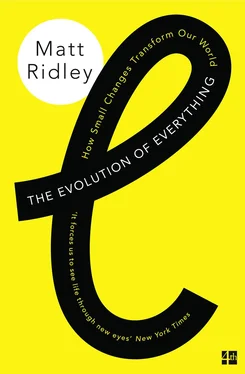Almost everybody answers this question in biological terms: a mutation in some gene, altering some aspect of brain structure, gave our ancestors a new skill, which enabled them to build a culture that became cumulative. Richard Klein, for instance, talks of a single genetic change that ‘fostered the uniquely modern ability to adapt to a remarkable range of natural and social circumstance’. Others have spoken of alterations in the size, wiring and physiology of the human brain to make possible everything from language and tool use to science and art. Others suggest that a small number of mutations, altering the structure or expression of developmental regulatory genes, were what triggered a cultural explosion. The evolutionary geneticist Svante Pääbo says: ‘If there is a genetic underpinning to this cultural and technological explosion, as I’m sure there is …’
I am not sure there is a genetic underpinning. Or rather, I think they all have it backwards, and are putting the cart before the horse. I think it is wrong to assume that complex cognition is what makes human beings uniquely capable of cumulative cultural evolution. Rather, it is the other way around. Cultural evolution drove the changes in cognition that are embedded in our genes. The changes in genes are the consequences of cultural changes. Remember the example of the ability to digest milk in adults, which is unknown in other mammals, but common among people of European and east African origin. The genetic change was a response to the cultural change. This happened about 5,000–8,000 years ago. The geneticist Simon Fisher and I argued that the same must have been true for other features of human culture that appeared long before that. The genetic mutations associated with facilitating our skill with language – which show evidence of ‘selective sweeps’ in the past few hundred thousand years, implying that they spread rapidly through the species – were unlikely to be the triggers that caused us to speak; but were more likely the genetic responses to the fact that we were speaking. Only in a language-using animal would the ability to use language more fluently be an advantage. So we will search in vain for the biological trigger of the human revolution in Africa 200,000 years ago, for all we will find is biological responses to culture. The fortuitous adopting of a habit, through force of circumstance, by a certain tribe might have been enough to select for genes that made the members of that tribe better at speaking, exchanging, planning or innovating. In people, genes are probably the slaves, not the masters, of culture.
Music, too, evolves. To a surprising extent, it changes under its own steam, with musicians carried along for the ride. Baroque begets classical begets romantic begets ragtime begets jazz begets blues begets rock begets pop. One style could not emerge without the previous style existing. There are hybridisation events along the way: African traditional music mates with blues to produce jazz. Instruments change, but mainly as a result of descent with modification from other instruments, not by de novo invention. The piano is the descendant of the harpsichord, which shares an ancestor with the harp. The trombone is the daughter of the trumpet and the cousin of the horn. The violin and the cello are modified lutes. Just as Mozart could not have written what he did if Bach and his like had not written what they did, nor could Beethoven have written his music without drawing upon Mozart. Technology matters, but so do ideas: Pythagoras’s discovery of the octave scale was a crucial moment in the history of music. So was syncopation. The invention of the amplified electric guitar made small groups able to entertain large ones as easily as orchestras once could. The point is that there was an inexorable inevitability about the gradual progress of music. It could not stop changing as each generation of musicians learned and experimented with music.
The evolution of marriage
One of the characteristics of evolution is that it produces patterns of change that make sense in retrospect, but that came about without even a hint of conscious design. Take the human mating system. The emergence, fall, rise and fall again of marriage over the last few thousand years constitute a fine example of this pattern. I am not talking about the evolution of mating instincts, but the history of cultural marriage habits.
The instincts are there, sure enough. Human mating patterns plainly still reflect ingrained genetic tendencies honed in the African savannah over millions of years. Judging by the modest difference in size and strength between men and women, we are clearly not designed for pure polygamy of the gorilla kind, where gigantic males compete for ownership of stable harems of females, killing the predecessor male’s babies when they succeed. On the other hand, judging by the modest size of our testicles, we are not designed for the sexual free-for-all of chimpanzees and bonobos, where promiscuous females (in what is probably an instinctive bid to prevent infanticide) ensure that most male-to-male competition happens between sperm rather than between individuals, blurring paternity. We are like neither of these. Hunter-gatherer societies, it turned out once we got to study them starting in the 1920s, are mainly monogamous. Males and females form exclusive pair bonds, and if either sex desires sexual variety it largely seeks it in secret. Monogamous pair bonding, with fathers closely involved in providing for offspring, seems to be the peculiar human pattern that men and women adopted for most of the past few million years. This is unusual among mammals, much more common among birds.
Конец ознакомительного фрагмента.
Текст предоставлен ООО «ЛитРес».
Прочитайте эту книгу целиком, купив полную легальную версию на ЛитРес.
Безопасно оплатить книгу можно банковской картой Visa, MasterCard, Maestro, со счета мобильного телефона, с платежного терминала, в салоне МТС или Связной, через PayPal, WebMoney, Яндекс.Деньги, QIWI Кошелек, бонусными картами или другим удобным Вам способом.












